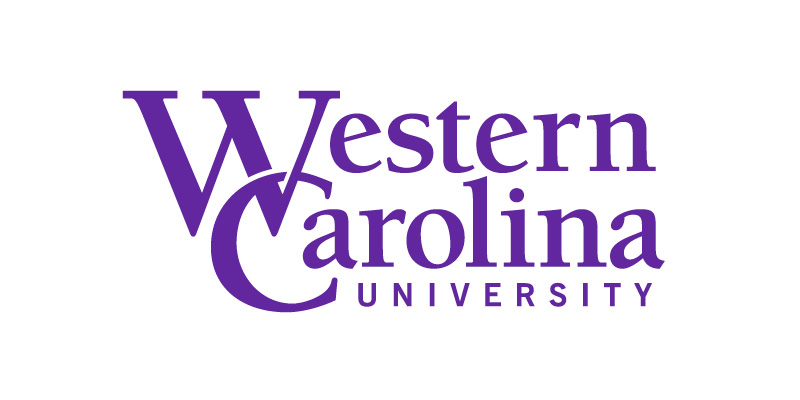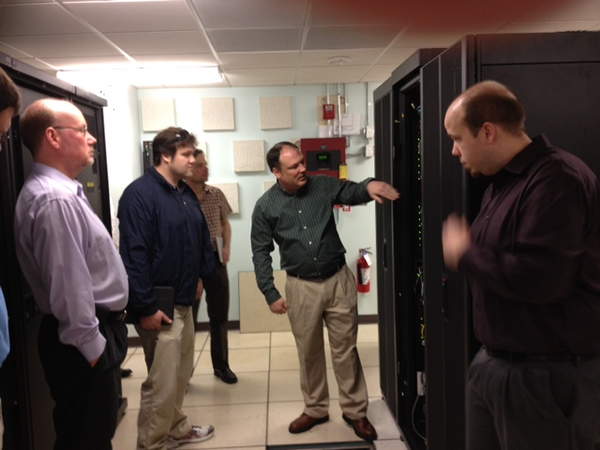In the performing world, it’s called the “backstage tour.” In the IT world, it’s the data center tour. Faculty and staff members of IT’s governance committees and council spent their March meetings touring the IT data center. Hosted by staff members Akum Jamir, Patrick McGraw, Mark Murphy and Scott Swartzentruber, committee and council members entered the “Inner sanctum” for a first hand look at the infrastructure technology hub of the campus.
After an introduction to the newest concepts of server, storage and backups, committee members saw firsthand the blade servers that host many systems, save power, create less heat, and allow for more integration. Patrick McGraw explained IT’s use of virtual servers which save money and space, creating our own “Cloud.” Even though sound baffles are located on the walls, the data center is noisy due to the air conditioning required to keep the systems cool. Should a power failure occur, a backup generator kicks in. Access is tightly controlled; all visitors had to sign in to record their presence.
Committee members saw Tier One storage- the fastest available for systems like Banner. Laura Huff, a member of the Infrastructure Advisory Committee, was able to locate her server for 25 live, WCU’s event scheduler. When the tour moved to the monitoring areas for Systems and Operations, Laura was able to see on the monitor the live activity of her application. One thing that was made clear is that WCU is fast running out of storage.
Laura noted, “Touring the data center was very informative. Having the opportunity to see the technology, both in terms of hardware and software, that drives the data center was very interesting. It helped me to better understand the complexities associated the information that IT manages.” Mary Teslow, faculty in HHS and chair of the Administrative Technology Advisory Committee said of the experience, “Tremendous. We have now seen the foundation and how important it is for everything to work. It helps us to think about projects and all that is involved.”
Commenting on his tour experience, Aaron Krauss observed, “Visiting the Data Center gave us an opportunity to see the IT infrastructure in place and the incredible complexities that go into maintaining and enhancing it. It was reassuring to see all of the monitoring taking place to ensure this University, faculty, staff, and students included are given the best Information Technology resources we can provide in the ever changing market.”
Andy Dalton, assistant professor in the department of computer science observed, ” Touring the data center was very informative. Having the opportunity to see the technology, both in terms of hardware and software, that drives the data center was very interesting. It helped me to better understand the complexities associated the information that IT manages.”
The group also visited the networking monitoring room where they observed the actual live use of bandwidth on campus with video streaming taking most of the capacity. IT doubled WCU’s internet capacity 18 months ago and the campus is already using 90 percent of it.
Patrick McGraw, IT systems engineer, summed it up best: “WCU is like a small city We have a lot of the same components like a police department, health center, etc, that a normal business wouldn’t have. So we have a lot more regulations and issues we have to be aware of and consider when dealing with technology. Lots more compliance pieces like FERPA an HIPAA.”
Patrick added, “The data center is like a central hub for services. IT provides infrastructure for the campus. Much in the same way that a city’s water plant would distribute water from a central source, we provide internet from the data center. The same comparison can be made for TV, Phone (eventually) and services like Active Directory functions. We either distribute these services or hold them in a protected manner for users to come and get (such as mercury data).”
As new members join the committees and council, they will also be given a data center tour as part of IT’s commitment to sharing information and building relationships with the campus.

